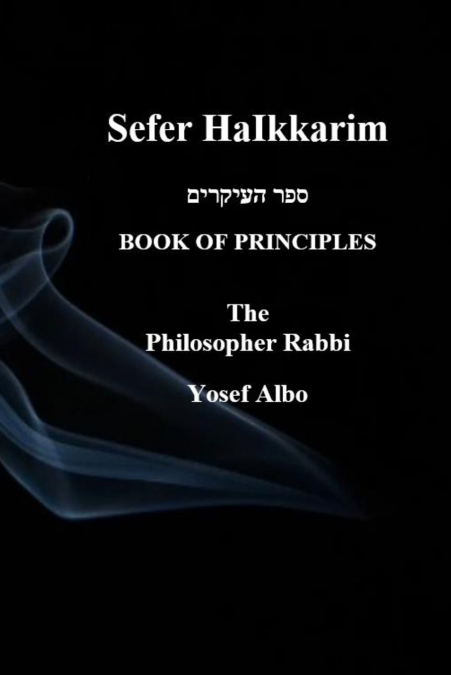
The Philosopher Rabbi Yosef Albo
The Book Of Principles Sefer HaIkkarimJewish PhilosophyKabbalist RabbiJOSEPH ALBO ZT'L oseph Albo (Hebrew: יוסף אלבו; c. 1380-1444) was a Jewish philosopher and rabbi who lived in Spain during the fifteenth century, known chiefly as the author of Sefer ha-Ikkarim ('Book of Principles'), the classic work on the fundamentals of Judaism.Albo’s birthplace is generally assumed to be Monreal del Campo, a town in Aragon. This is based on Astruc ha-Levi’s report of the religious debate held at Tortosa in 1413-14, which mentions Albo as one of the Jewish participants and notes he was the delegate of the congregation of Monreal. However, the Latin account of this debate makes no reference to this locality. Heinrich Graetz believes that Albo could not have been less than thirty years of age when he was sent to take part in the disputation, and he accordingly places the date of Albo’s birth not later than 1380. His date of death is given variously as 1444 (most likely) or 1430. He is mentioned, however, as preaching at Soria in 1433. The use Albo makes of medical illustrations creates the presumption that he was adept in medical science, which suggests that he may have practiced medicine. He was versed to some degree in the writings of Arab Aristotelians. His teacher was Hasdai Crescas, author of Or Hashem. Opinions vary on whether Crescas was still alive when Sefer ha-Ikkarim was published. Sefer haIkkarim ('Book of Principles') is a fifteenth-century work by rabbi Joseph Albo, a student of Hasdai Crescas. It is an eclectic, popular work, whose central task is the exposition of the principles of Judaism. The work contains a number of internal contradictions. Most modern scholars see these as errors, while a minority of modern scholars see them as Albo’s method for conveying esoteric messages. His work is best known for its discussion of the Jewish principles of faith, in which he argues with other thinkers such as Maimonides. Albo stated that any religion (dat elohit), including Judaism, must have the following three fundamental principles, which he calls ikkarim (fundamentals) or ikarim kollelim (general fundamentals): A. belief in the existence of God. B. belief in the revelation of God. C. belief in divine justice, as related to the idea of immortality. From these three principles, Rabbi Albo posited that a religion must have eight derivative principles shorashim [roots] or ikkarim peratiim [specific fundamentals]) which follow logically from the three fundamentals: From the existence of God: God’s unity, God’s incorporeality, God’s timelessness, God’s perfection: in God there can be neither weakness nor other defect. From the revelation of God: God’s prophecy, God’s prophet authentication. From the reward and punishment of God: God’s omniscience. Reward and punishment, whether in this world or the World to Come.